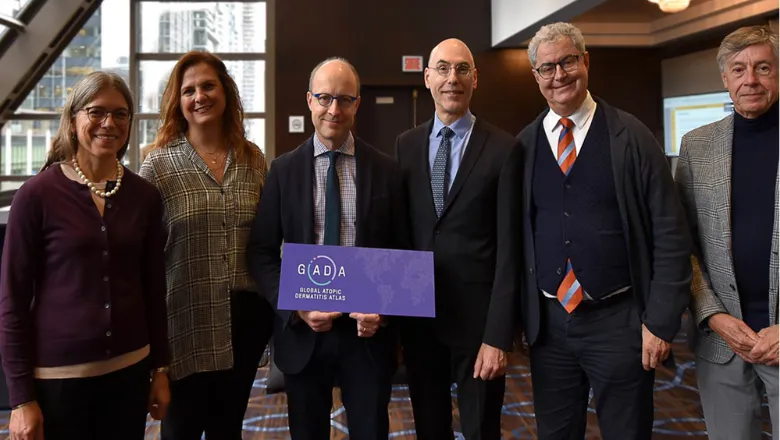The support from the LEO Foundation will significantly enhance our ability to continue to collect and analyse burden data on atopic dermatitis globally.Our goal is to create a comprehensive atlas that provides critical insights into the prevalence, severity,and treatment of AD, filling the gaps in our current understanding.
Professor Carsten Flohr
30 October 2023
Global Atopic Dermatitis Atlas (GADA) to become a leading open resource within atopic dermatitis
Funding from the LEO Foundation marks a significant milestone for GADA

The Global Atopic Dermatitis Atlas (GADA), led by Professor Carsten Flohr, Chair in Dermatology and Population Health Sciences at King’s College London, has been awarded a DKK 10 million (GBP 1.6 million) grant funding support from the LEO Foundation.
GADA is a worldwide, long-term project, pioneering international initiative dedicated to advancing our understanding of Atopic Dermatitis. The aim of GADA is to create and maintain an atlas where all data about Atopic Dermatitis is available in one place, of all the countries: how many people have it, at what age, how severe it is, and how it is treated.
Atopic Dermatitis, commonly known as eczema, poses substantial challenges to millions of people across the globe. Characterised by inflamed and intensely itchy skin, AD often leads to sleep disturbances and reduced quality of life. This condition affects approximately 20% of children and 10% of adults in high-income countries and urban areas of middle and low-income nations.According to the Global Burden of Disease data, AD ranks 15th among all non-fatal diseases and holds the first position among skin diseases globally.
The funding from the Leo Foundation marks a significant milestone in the mission to consolidate and analyse comprehensive data from around the world, ultimately leading to better care and support for individuals living with this challenging skin condition. This will support the work of GADA and form an important strategic collaboration with leading organisations the International League of Dermatological Societies (ILDS) and collaborating GADA partners from all over the world.
Atopic dermatitis not only affects individuals physically but also carries a significant psychological burden, including anxiety and depression. It is also associated with the development of food allergies, allergic rhinitis, asthma, and other chronic inflammatory conditions. Despite the progress made in treating severe forms of Atopic Deramatitis in recent years, there is a pressing need for accurate and uniform epidemiological data, particularly in low and middle-income settings.
The ILDS is proud to welcome the LEO Foundation as a collaborator in this crucial endeavor. Atopic Dermatitis is a global health concern that requires a comprehensive and coordinated approach. The collaboration between ILDS, the LEO Foundation, and key GADA collaborating partners will enable us to address disparities in atopic dermatitis care, enhance access to treatments, and ultimately improve the lives of those affected by this condition.
Professor Henry W. Lim, ILDS President
In October 2022, GADA launched the first Global Report on Atopic Dermatitis,offering valuable insights into the worldwide prevalence and burden of the disease. This report comprehensively summarizes the disease's impact,geographical disparities in prevalence data, treatment availability, and inequalities in access to therapeutics.
The generous commitment from the LEO Foundation funds a systematic evidence synthesis of the worldwide AD burden data, as well as an international consensus exercise to optimise research methodology and the building of a digital ecosystem for future epidemiological studies.
Chief Scientific Officer at the LEO Foundation Anne-Marie Engel highlighted the organisation's commitment to advancing dermatological research and care, stating: “Atopic dermatitis is a burden to individuals, families, and societies on a worldwide scale, and we need global initiatives like GADA to address the challenges associated with the disease. GADA collects validated data that put together provide a 360-degree view of the disease. This is essential to improve treatments and methods of disease prevention, and important whether you are a researcher, clinician, patient, or policymaker,” she says and continues:
“At the LEO Foundation, we are excited to support this collaboration of international experts paving the way for a better understanding of atopic dermatitis. It is our ambition to support initiatives that drive a holistic and forward-thinking understanding of skin diseases, ultimately improving the lives of people affected, and we believe that GADA fits this very well.”
For more information about the Global Atopic Dermatitis Atlas (GADA) and this collaboration, please visit www.atopicdermatitisatlas.org or contact info@atopicdermatitisatlas.org

